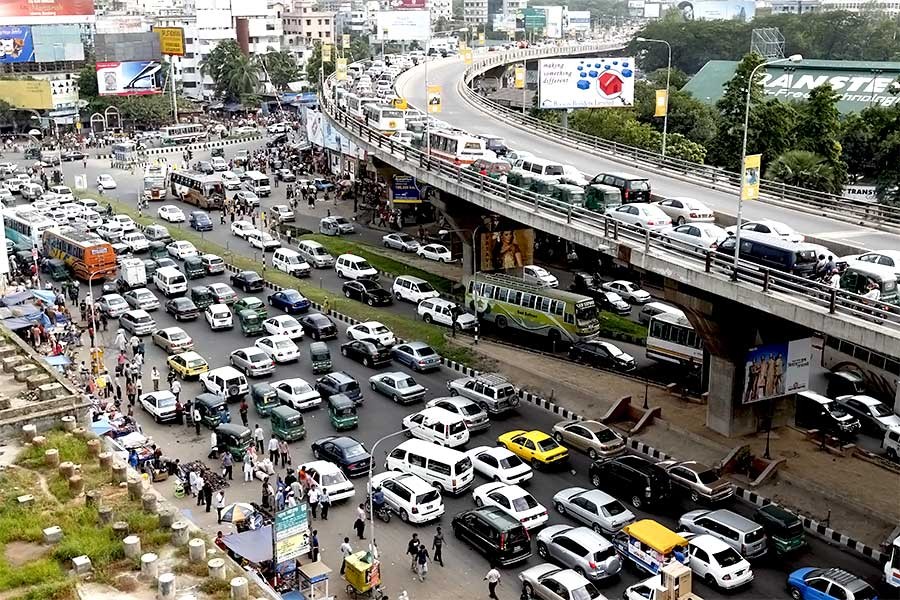The traffic congestion in Dhaka city continues to cost the country billions of dollars and thousands of man-hours. It eats up 3.2 million work-hours per day. Such a situation is hardly witnessed anywhere in the world.
In the last 10 years, average traffic speed in Dhaka has dropped from 21 kilometres per hour (kmph) to 7.0kmph, which is slightly above the average walking speed, according to a World Bank (WB) analysis. And by 2035, the speed might drop to 4.0kmph, slower than walking speed, it said.
What is worrying is that the city's urban development has not kept up with its rapid growth, resulting in a messy and uneven urbanisation process. Lack of adequate planning has led to poor liveability and vulnerability to disasters like floods and earthquakes.
Another study says traffic congestion in Dhaka costs the country $11.4 billion every year, which is seven per cent of the country's Gross Domestic Product (GDP). About one quarter of working hours are lost in congestion as about 1.5 million citizens use vehicles for travelling across the city every day, it said.
The congestion may be reduced by 40 per cent by just improving the management of traffic as 98 per cent of the people very often break the laws on the road. Besides, there are problems like illegal occupation of road, haphazard parking, and an uncontrolled rise in the number of private vehicles.
Apart from the economic impact, the congestion is also harmful for the travellers' health, their society and environment. Around three quarters of travellers face both physical and psychological health impacts, the study says.
In order to ease traffic congestion, the government has planned to build 81.90 kilometres circular rail network having elevated viaduct and double line standard gauge around the capital city. A survey for proper implementation of the rail transport having 20 stations circular railway network is underway. The project is expected to be implemented after the feasibility study along with other necessary procedures.
Besides, the authorities are contemplating building metro rail, flyovers, circular waterways, elevated expressway and bus rapid transit for smooth movement of the city dwellers by reducing pressure on the city roads.
The government is reported to have formed a company for overseeing bus operations in the capital with the aim of providing better services to the people and reducing traffic congestion. As per the plan, at least 105 modern articulated buses would initially run on two routes under a pilot project of the company -- Bus Network Management Company.
The government believes traffic jams will be reduced once the service is introduced on two routes. The speed of the buses will also increase to 15-17kmph from the current 5.0-7.0kmph. As per the proposed pilot corridor, two groups of bus operators will be created from the bus operators who will run their buses on the two routes.
Mention may be made that the people of Dhaka and its suburbs generate 30 million trips every day and buses are used for 47 per cent of these trips. When five Mass Rapid Transit (MRT) and two Bus Rapid Transit (BRT) projects will be implemented by 2035, these might reduce 17 per cent demand but the rest of the demand has to be mitigated by buses.
For this reason, Strategic Transport Plan (STP) and the revised STP recommended reorganising the bus management system and rationalising bus routes. But the fact remains that substantial investment was needed for restructuring of the bus transport sector and disciplining the system.
The Bus Network Study-2016, which was carried out under a project financed by the WB, recommended a separate government company to monitor bus companies in the capital. Cities like New Delhi, Singapore and Seoul have such companies.
The recent move to form a government company appears to be a 'good initiative' for bringing discipline in this sector. At present, after taking route permits from regional transport committees, the buses go to Bangladesh Road Transport Authority (BRTA) just only once a year for fitness certificates. There is no single authority to look into the sector.
But bringing discipline in the transport sector will be tough if some buses are allowed to use dedicated lanes on the busy city roads. As traffic congestion in the city is pretty chaotic, no permission should be given to any transport for exclusive use of the lane.


